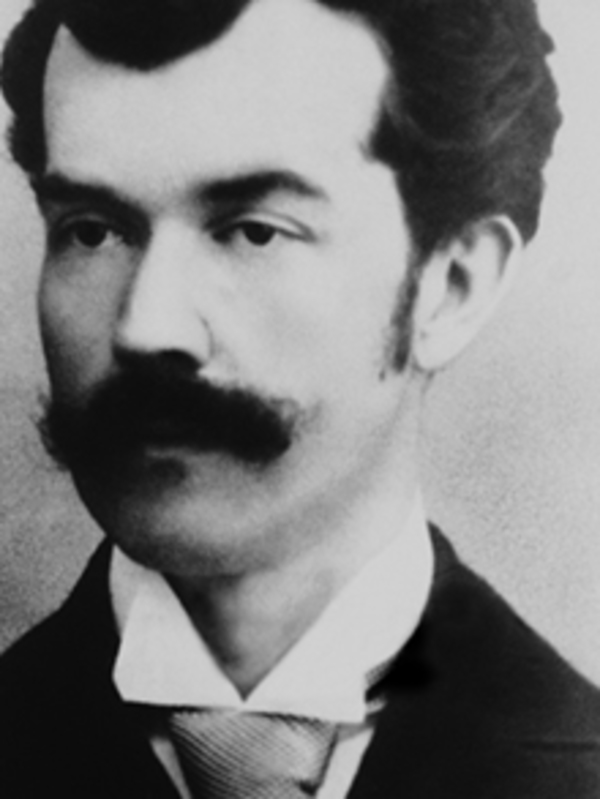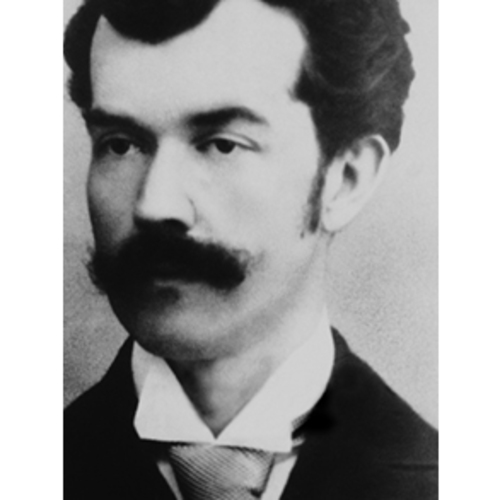
Source: Link
BOISVERT, EDMOND (baptized Abraham-Edmond), known as Edmond de Nevers, lawyer, writer, journalist, translator, and office holder; b. 12 Feb. 1862 in Baie-du-Febvre, Lower Canada, son of Abraham Boisvert, a farmer, and Marie Bison; d. unmarried 15 April 1906 in Central Falls, R.I.
Edmond Boisvert was the eldest boy in a family of 16. Even in elementary school he attracted attention by his penchant for studying and for books. In 1873 he entered the Séminaire de Nicolet. The other first-year students called him Boisvert the poet, because of the teasing verses he wrote about them. In his third year (Method) he took German lessons from Abbé Thomas-Marie-Olivier Maurault, who was also his professor in the fifth year (Belles-Lettres). Since he decided to take the university entrance examinations in arts and at the same time to cover independently the material in the two-year Philosophy program, his sixth year (Rhetoric) was the last one he spent at the school. He then appeared before a board of examiners to obtain the diploma that would admit him to the study of law.
In January 1880 Boisvert began articling in the office of Jean-Baptiste-Ludger Hould, a lawyer in Trois-Rivières. He spent three years there, during which time he also learned English from a young Irishman, played the piano and violin, and amused himself drawing caricatures of the litigants at the court-house. He was called to the bar in 1883, but seems not to have practised law. From the time of his arrival in Trois-Rivières, in fact, he had had his mind made up to leave for Europe as soon as his studies were finished. It is thought that, to save the money needed, he took a job as an inspector of insane asylums in the province.
On 14 April 1888 Boisvert embarked at New York for Germany. Landing in Bremen, he went immediately to Berlin, and there he devoted himself to studying history, literature, and political economy. In his room at 172a Schönhauser Avenue he still practised the violin as much as four hours a day and took lessons from a private teacher. When he had been there a month, he sent his first “Lettre de Berlin” to La Presse in Montreal, which published a series of his letters between 5 July 1888 and 15 March 1891. Boisvert lived in Berlin until April 1889, and then in Vienna until the fall of 1890, making trips to Venice, Hungary, and finally Rome, where he stayed until March 1891. In April he was in Paris. The following month, Edmond de Nevers – as he had signed his letters and articles from the time he came to Berlin – entered the employ of the Agence Havas as a translator and writer, a position that required mastery of several languages and a broad fund of knowledge. In addition to French and English, Nevers spoke German and had learned Italian, Spanish, Portuguese, Russian, and Norwegian. In 1893 he published a translation of two plays by Henrik Ibsen. Although busy with all this work, he did not forget his native land. That year he devoted considerable effort to the early stages of L’avenir du peuple canadien français, which would come out three years later. He had completed the research for it in London by 1895 and then returned to North America, going to the United States, where his family had taken up residence, and to Quebec, where he had many relatives and friends. The following year he went back to Paris and began reading about the United States; his conclusions were published in 1900 under the title L’âme américaine.
The 12 years Nevers had spent in Europe were devoted to study, research, and the writing of three books. He had studied with the best scholars in the social sciences and humanities, and closely followed the political, economic, and cultural life of the European nations. However, he did not neglect the company of his compatriots who were passing through or making extended visits, for example, his brothers Ulric, Édouard, and Lorenzo, and politicians such as Adélard Turgeon, Rodolphe Lemieux*, and Honoré Beaugrand, as well, of course, as numerous students, mostly physicians and artists. From 1897, illness forced him to go out less frequently and to entertain friends in his room on Quai Montebello. Abbé Camille Roy*, who was studying in Paris, was strongly influenced by Nevers’s ideas on educational problems.
On 14 July 1900 Nevers, who had been ill for a long time, embarked at Le Havre to return to North America. He had learned the day before that he was suffering from locomotor ataxy. He moved into a house on Rue Charlevoix in Quebec and became a publicist with the provincial Department of Colonization and Mines. In addition to setting up a colonization program for his employers, he gave lectures in Quebec, Montreal, and New England, and published numerous articles. Upon his arrival in Quebec, he had begun working on a translation of Matthew Arnold’s Civilization in the United States . . . , which would come out in 1902. On 30 March 1901 his friends gave a private dinner in his honour at the Hôtel Viger in Montreal. The master of ceremonies was Gonzalve Desaulniers* and the guests included lawyers Lomer Gouin* and Rodolphe Lemieux, journalist Olivar Asselin*, and the consuls of France, Switzerland, and Russia. Feeling his strength fail, Nevers had to leave Quebec at the end of 1902 or early in 1903. He lived with his parents for the rest of his life and died at Central Falls on 15 April 1906 at the age of 44.
As a musician, painter, and poet, Nevers might have become one of the great French Canadian cultural figures of the turn of the century, like Emile Nelligan* or Charles Gill*. But from his school-days, he was haunted by the destiny of the French Canadian people in North America. He ceaselessly pursued the study of history, literature, and the social sciences seeking to understand French Canadian society and the United States, and thus to make better preparations for the future of his people, not only in Quebec but also within the framework of integration into the United States. In L’avenir he had set out a complete program for political action and for the reform of the educational system. L’âme américaine showed his ability to analyse and synthesize, his critical intelligence, and his powers of observation. Nevers exerted a profound influence on the nationalists of his day and on many of those who came after him. He still had several works in progress at the end of his life, including a book on Canadian economic questions and a novel about political customs.
Although he wrote mainly about Canada, Quebec, and the United States, Nevers was nevertheless well informed about the major problems confronting the western world in the late 19th century. As his correspondence and the articles in La Presse show, the topics that concerned him included international politics, colonial affairs, social problems, and anti-Semitism. Sociologist Léon Gérin*, who proposed him for membership in the Royal Society of Canada in 1901, considered Edmond de Nevers the greatest French Canadian intellectual of his time.
Edmond de Nevers [Edmond Boisvert] is the author of L’avenir du peuple canadien-français (Paris, 1896) and of L’âme américaine (2v., Paris, 1900). In addition he published translations of works by Henrik Ibsen and Matthew Arnold as L’union des jeunes et les soutiens de la société, Pierre Bertrand et Edmond de Nevers, trad. (Paris, 1893), and Études sur les États-Unis, Edmond de Nevers, trad. (Québec, 1902), respectively.
For a full bibliography on the life and work of Edmond de Nevers, see Claude Galarneau, Edmond de Nevers essayiste, suivi de textes choisis (Québec, 1959).
ANQ-MBF, CE1-13, 12 févr. 1862. Le Journal de Françoise (Montréal), 21 avril 1906. La Patrie, 1er avril 1901. Le Soleil, 20, 28 avril 1906. Ferdinand Brunetière, “L’âme américaine,” Rev. des deux mondes (Paris), 1er déc. 1900: 664–702. DOLQ, 1: 48–51; 2: 32–34. Antonio Perrault, “Les précurseurs: Edmond de Nevers,” L’Action française (Montréal), 3 (1919): 193–218. François Ricard, “Edmond de Nevers: essai de biographie conjecturale,” L’essai et la prose d’idées au Québec . . . (Montréal, 1985), 347–66.
Cite This Article
Claude Galarneau, “BOISVERT, EDMOND (baptized Abraham-Edmond), known as Edmond de Nevers,” in Dictionary of Canadian Biography, vol. 13, University of Toronto/Université Laval, 2003–, accessed January 22, 2025, https://www.biographi.ca/en/bio/boisvert_edmond_13E.html.
The citation above shows the format for footnotes and endnotes according to the Chicago manual of style (16th edition). Information to be used in other citation formats:
| Permalink: | https://www.biographi.ca/en/bio/boisvert_edmond_13E.html |
| Author of Article: | Claude Galarneau |
| Title of Article: | BOISVERT, EDMOND (baptized Abraham-Edmond), known as Edmond de Nevers |
| Publication Name: | Dictionary of Canadian Biography, vol. 13 |
| Publisher: | University of Toronto/Université Laval |
| Year of revision: | 1994 |
| Access Date: | January 22, 2025 |



